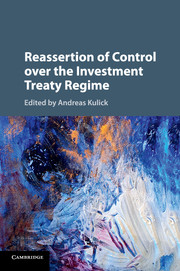Book contents
- Frontmatter
- Contents
- List of Contributors
- Preface
- PART I Introduction, Theory and Domestic Law Approaches
- 1 Reassertion of Control: An Introduction
- 2 Masters and Guardians of International Investment Law: How to Play the Game of Reassertion
- 3 Reassertion of Control and Contracting Parties' Domestic Law Responses to Investment Treaty Arbitration: Between Reform, Reticence and Resistance
- PART II Procedural Aspects and Avenues of Reassertion
- PART III Substantive Aspects and Avenues of Reassertion
- PART IV Reassertion of Control: Policy and Trends
- Index
2 - Masters and Guardians of International Investment Law: How to Play the Game of Reassertion
from PART I - Introduction, Theory and Domestic Law Approaches
Published online by Cambridge University Press: 12 January 2017
- Frontmatter
- Contents
- List of Contributors
- Preface
- PART I Introduction, Theory and Domestic Law Approaches
- 1 Reassertion of Control: An Introduction
- 2 Masters and Guardians of International Investment Law: How to Play the Game of Reassertion
- 3 Reassertion of Control and Contracting Parties' Domestic Law Responses to Investment Treaty Arbitration: Between Reform, Reticence and Resistance
- PART II Procedural Aspects and Avenues of Reassertion
- PART III Substantive Aspects and Avenues of Reassertion
- PART IV Reassertion of Control: Policy and Trends
- Index
Summary
A. Introduction
Any discussion of reassertion of control by Contracting Parties over international investment law must proceed on the basis of certain assumptions about the nature of the legal order within which it takes place. The intellectual framework for this chapter is provided by the mainstream view of public international law, described by James Crawford in the following terms:
[I]nternational law is the product of a process of claim and counterclaim, assertion and reaction, by Governments as representative of States and by other actors at the international level. This implies a diffuse judgment which may take time to arrive at, although where the judgment is widely shared or is formulated by a body recognised as authoritative in the matter, such as the Security Council acting under Chapter VII of the Charter or a competent regional organisation, or a competent court or tribunal, the judgment may be arrived at fairly rapidly and may stick. But it is always the process of articulation and assessment that occurs where rights or interests are engaged at the international level that matters. International law is a form of praxis involving diffuse, decentralised but nonetheless observably real authority. At the same time it is a process in which rights are asserted and duties relied on by reference to norms based on express agreement or custom. International law is both a process of assertion and reliance and a system of principles and rules: together they constitute the course of international law, confounding those critics who simplemindedly assert that it can be one (process) or the other (system) but not both.
It goes without saying – but may go even better by being said – that international law is not the only frame of reference for discussion of international investment matters, nor is it necessarily a better frame than others. Much valuable work in the field is done by scholars with a background in international commercial arbitration, international commercial litigation and domestic public law; by scholars of critical-theoretical or inter-disciplinary persuasions; and by economists and political scientists. But the perspective of public international law, articulated with appropriate modesty and with no necessary claim to greater legitimacy, can at the very least usefully complement these voices.
International investment law is public international law. There is nothing conceptually different, innovatory or sui generis about it.
- Type
- Chapter
- Information
- Reassertion of Control over the Investment Treaty Regime , pp. 30 - 52Publisher: Cambridge University PressPrint publication year: 2016
- 1
- Cited by



